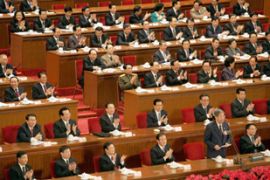China set to approve property law
China presents private ownership law to parliament to stop land confiscations.

Legal protections
Wang said: “As the reform and opening-up of the economy develop, people’s living standards have improved in general and they urgently require effective protection of their own lawful property accumulated through hard work.”
He also said the law does not threaten the state-owned sector but provides it with legal protections as well.
Land and some other assets have long been officially owned by the state in China and Wang said the law will keep public ownership “at the core of the economic system to prevent fraudulent acquisitions and mergers of state property”.
The draft strengthens the protection of state-owned property, stipulating that illegal possession, looting, illegal sharing, withholding or destruction of state property is prohibited.
Opposition
A letter of opposition to the law, signed by more than 3,000 former ministers, retired provincial and military chiefs, was presented to the NPC last year in what many feel slowed the passage of the bill into law.
Opponents have argued the law will help corrupt officials and others who have become rich through dubious means to protect their ill-gotten gains.
Supporters, however, say private companies will gain added protection against economic crime.
Many other experts have said China has little choice but to seek a firmer legal basis for the protection of the entire range of ownership forms now in existence, whether private or state.
The property law is likely to be ratified since the NPC has never rejected legislation put before it by the government.
The government also introduced a separate law that will set a unified 25 per cent income tax rates for foreign and domestic corporate entities.
Foreign firms currently pay 15 per cent and Chinese corporations 33 per cent, with the move effectively a large tax cut for local companies.